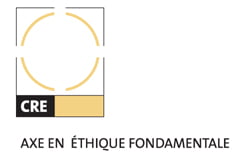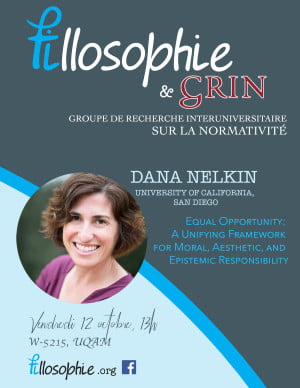
Dana Nelkin (University of California, San Diego)
Dans le cadre de ses ateliers mensuels, le GRIN en collaboration avec Fillosophie recevront Dana Nelkin (University of California, San Diego), qui offrira une présentation intitulée “Equal Opportunity: A Unifying Framework for Moral, Aesthetic, and Epistemic Responsibility”.
Abstract :
We naturally speak about moral obligations (e.g., “you ought to have kept your promise”) and we speak about epistemic ones and even sometimes what look like aesthetic ones, too (e.g., “you ought to have known that the polls were within the margin of error” and “you should have done better with that painting”). Similarly, we blame and praise people for epistemic and aesthetic transgressions and achievements, as well as moral ones. For these reasons, it is natural to conclude that our moral, aesthetic and epistemic practices should be treated in highly parallel ways, at least when it comes to the realm of holding responsible, praiseworthy, and blameworthy. At the same time, there are clear asymmetries between the moral and epistemic case, and also between the moral and the aesthetic, which might seem to doom any hope for a genuinely parallel treatment. For example, as many have pointed out, unlike actions or omissions, which are central objects of moral obligations, praise and blame, belief does not seem to be the kind of thing one has control over. When it comes to the aesthetic case, many have doubted that we have obligations in the way that we do in the other cases. Further, moral blame has seemed to many to be governed by a number of interpersonal norms that don’t seem to have parallels in either the pure epistemic or pure aesthetic case. Despite these challenges, I argue that the prospects are promising for a unifying framework that applies in all three cases while at the same time leaving room for divergence on some important dimensions. In particular, in this paper, I pursue the idea that one’s degree of blameworthiness or praiseworthiness depends on the quality of one’s opportunity in a given case.




